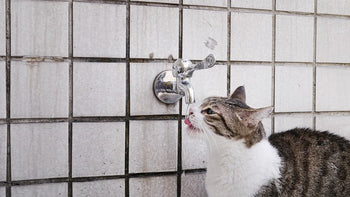Cats are known for their independent and stoic nature, which can make it tricky to tell when they’re feeling unwell. As a responsible cat owner or a potential pet product buyer, knowing how to spot the signs that your cat is sick is crucial for their overall well-being. In this blog, we’ll go through common symptoms and causes and what you can do to ensure your cat stays healthy and happy.

What Symptoms Should You Look For?
Cats often show subtle signs and symptoms of sickness, so it’s essential to keep a close eye on any changes in their behavior or physical condition. Some of the most common sick cat symptoms include:
- Low energy or lethargy: If your usually playful and active cat is suddenly sleeping more or showing little interest in their favorite activities, it could be a red flag.
- Loss of appetite or overeating: While fluctuations in appetite can happen, a significant decrease or increase in how much your cat is eating might point to underlying issues.
- Changes in litter box habits: Diarrhea, constipation, or even urinating more frequently could be signs of a sick cat, possibly due to digestive problems or urinary tract infections.
- Rapid weight gain or loss: If your cat's weight changes drastically in a short period of time without any change in diet or activity, it's time for a vet visit.
- Respiratory issues: Sneezing, coughing, or labored breathing could be a sign of respiratory infections like feline asthma or upper respiratory infections.
For example, Bella, a cat who normally greets her owner at the door, started hiding under the bed and losing interest in her food. After noticing her coat was looking dull, Bella’s owner took her to the vet and discovered she had a thyroid issue. The vet’s quick diagnosis and treatment helped Bella recover, which highlights the importance of knowing how to tell if your cat is sick.
What Causes These Symptoms?
Understanding the causes of illness can help you be more aware of your cat’s environment and health. There are several reasons why you might notice cat sickness symptoms, including:
Infections: Viruses, bacteria, and parasites are common causes of illness in cats. Diseases such as upper respiratory tract infections and feline immunodeficiency virus (FIV) can weaken a cat's immune system.
Poor nutrition: If your cat is not eating a balanced diet, they could suffer from malnutrition, leading to weight changes, a weak immune system, and other health issues.
Allergies: Cats can have allergies to certain foods, environmental factors (like dust or pollen), or even new furniture or cleaning products.
Stress: Changes in your cat’s environment, such as moving homes or introducing another pet, can cause stress and lead to unwell cat symptoms like over-grooming or digestive problems.
How Can You Tell if Your Cat is Really Sick?
It's not always easy to determine whether your cat is just having an off day or if something more serious is going on. Here are a few things you can do to assess their condition:
- Monitor their behavior closely: Take note of any sudden changes in behavior or habits. A journal can help track patterns and give valuable information to your vet.
- Check their temperature: A cat’s normal temperature is between 100.5°F and 102.5°F. If their temperature falls outside this range, it could be a sign your cat is sick.
- Observe their breathing and heart rate: Cats typically breathe 20 to 30 times per minute when resting. If their breathing seems labored or excessively fast, they may be struggling with a respiratory problem.
What Should You Do if Your Cat is Sick?
If you suspect that your cat is showing sick cat signs, here’s what you should do:
- Stay calm and take notes: Write down any symptoms, when they started, and any potential causes (new foods, stressors, etc.).
- Call your vet: It’s always better to be safe than sorry. If your cat’s symptoms persist for more than a day or two, contact your vet and provide them with as much detail as possible.
- Follow the vet’s advice: If your vet recommends an exam, medication, or specific treatments, be sure to follow through as instructed.
- Avoid self-medicating: Never give your cat over-the-counter medications meant for humans, as many of them can be harmful or even deadly to cats.

How Can You Prevent Your Cat from Getting Sick?
Preventive care is the best way to ensure your cat stays healthy. Here are some tips:
- Regular vet visits: Cats need annual check-ups to monitor their overall health and catch any issues early. Older cats or those with chronic conditions might need more frequent visits.
- Vaccinations: Make sure your cat is up to date on vaccinations to prevent diseases like rabies, feline leukemia, and distemper.
- Proper nutrition: Feeding your cat a well-balanced diet with the appropriate nutrients for their age and activity level is essential to maintaining good health.
- Exercise and mental stimulation: Cats need regular physical and mental stimulation to prevent obesity and behavioral problems. Interactive toys, scratching posts, and window perches can all help keep them engaged.The Uahpet toys collection offers a variety of interactive, safe, and engaging options for cats. These toys are designed with high-quality, non-toxic materials, ensuring your cat’s safety while providing fun and mental stimulation.
- Maintain cleanliness: Keep your cat’s litter box, food dishes, and sleeping area clean to reduce the risk of infections and parasites.Provide standard cat supplies such as healthy cat food, comfortable cat beds, etc.The Uahpet products for cats are crafted with safety, convenience, and comfort in mind. From automatic water fountains to elevated bowls, these items focus on promoting your cat’s health and hygiene while making daily care more efficient and enjoyable for pet owners.
By recognizing the signs of an unhealthy cat and taking preventive steps, you can help your cat live a long, healthy life, just like Bella, who returned to her usual energetic self once her health issues were addressed.
FAQ: Common Questions from Cat Owners
Q: How often should I take my cat to the vet?
A: It's recommended to take your cat to the vet at least once a year for a general check-up. However, older cats or those with health issues may require more frequent visits.
Q: Is it normal for my cat’s appetite to change?
A: Minor fluctuations in appetite can be normal, but significant or prolonged changes should be a cause for concern. If your cat refuses to eat for more than 24 hours, contact your vet.
Q: How can I prevent my cat from getting parasites?
A: Regular deworming treatments and flea prevention medications can help keep parasites at bay. Make sure to clean your cat’s environment regularly.














